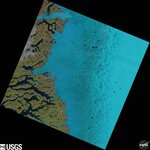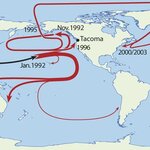
The change in global sea level rise since the beginning of the 20th century has been significantly larger than previous estimates according to new estimates in a new paper.
The paper, co-authored by Carling Hay, a Harvard post-doctoral fellow in the Department of Earth and Planetary Sciences (EPS), and Eric Morrow, a recent PhD graduate, says that previous estimates of global sea-level rise from 1900-1990 had been over-estimated by as much as 30 percent.
But it confirms previous estimates of sea-level change since 1990, and that suggests that the rate of sea-level change is increasing…







